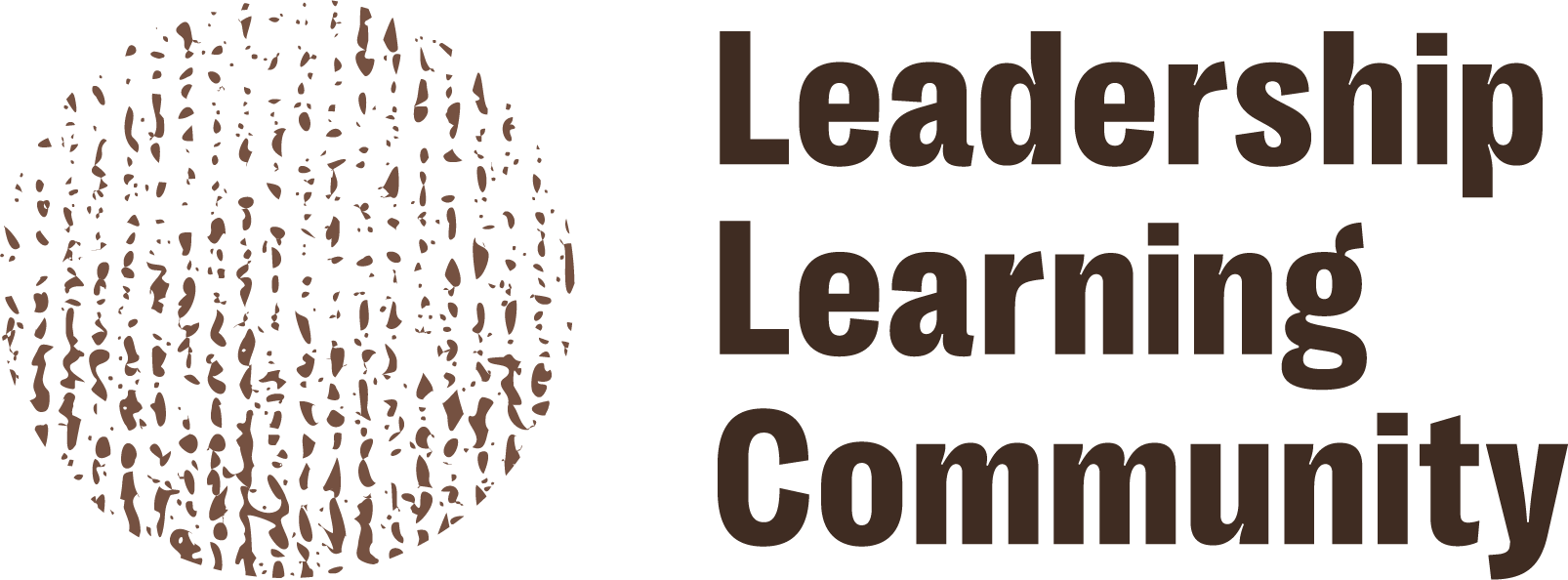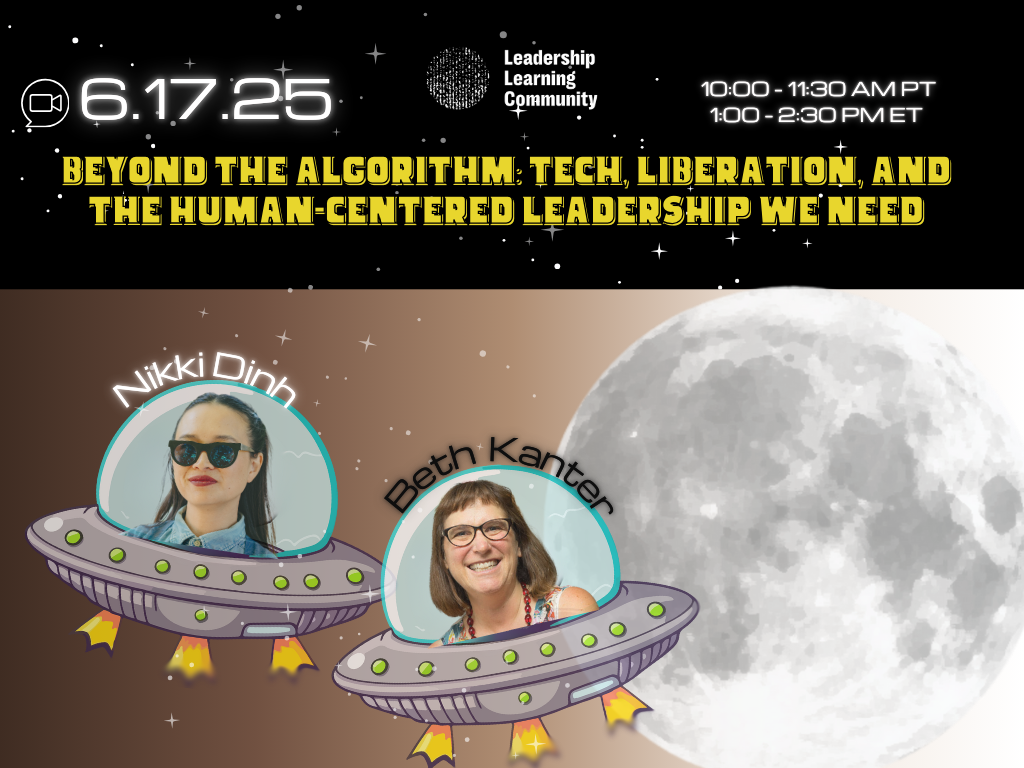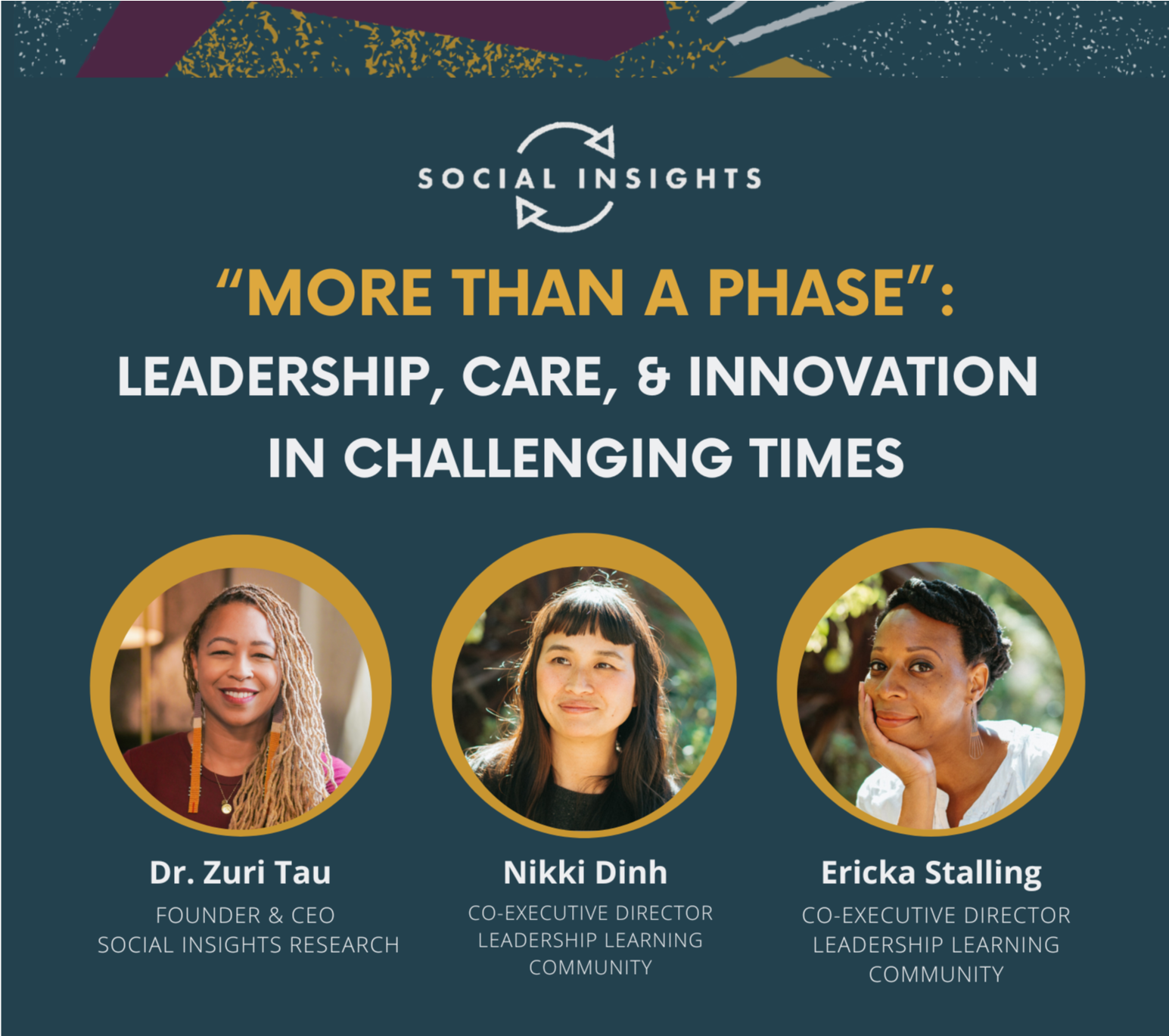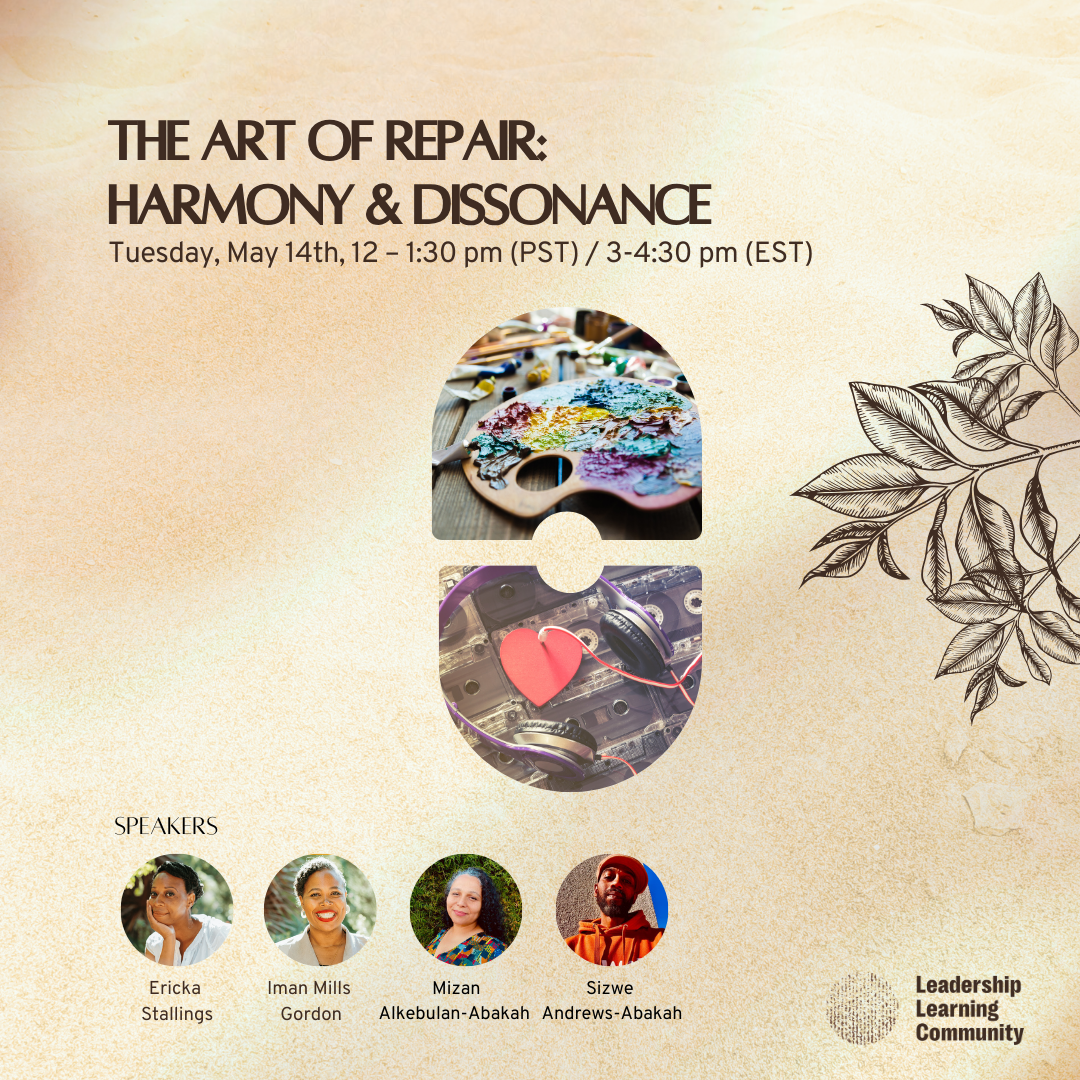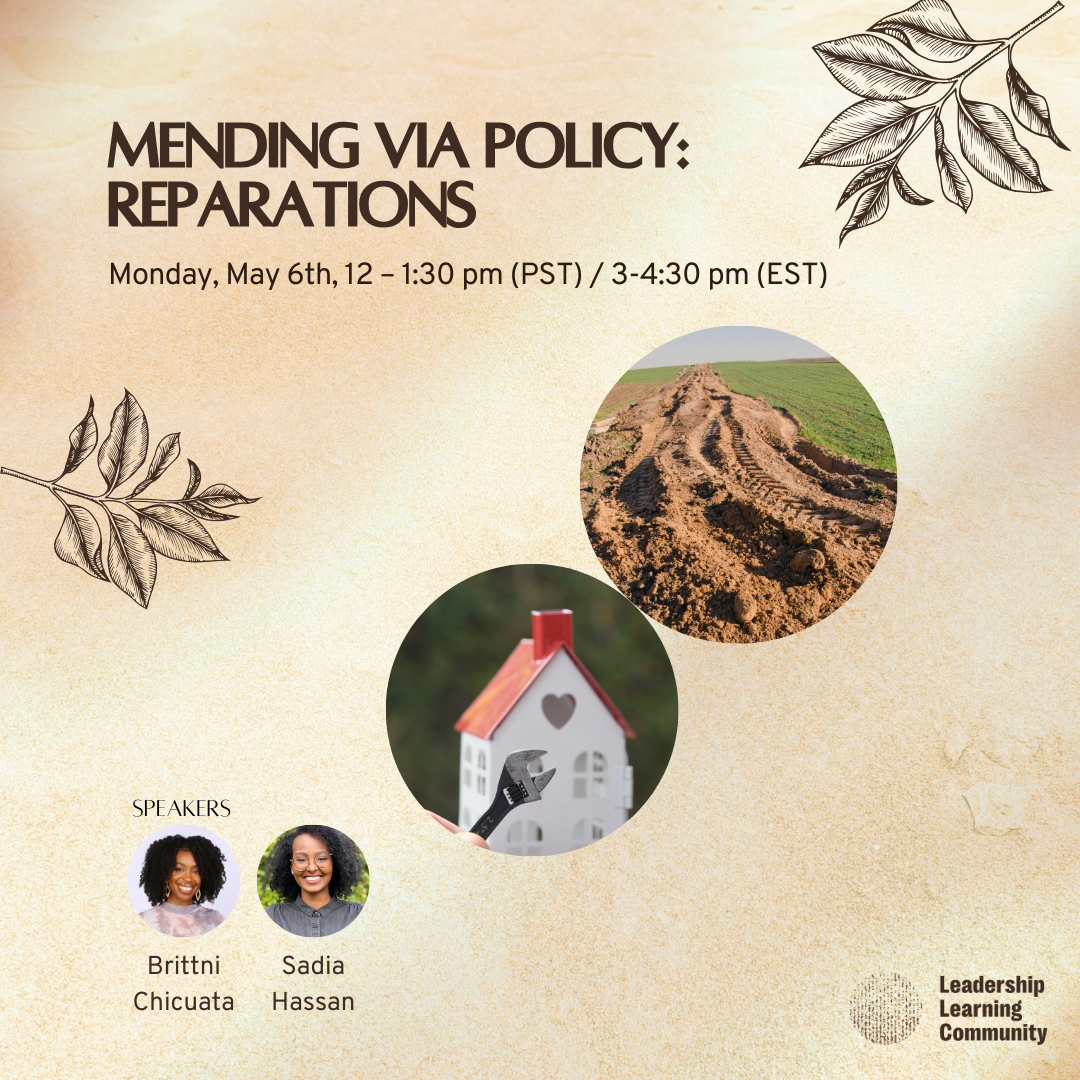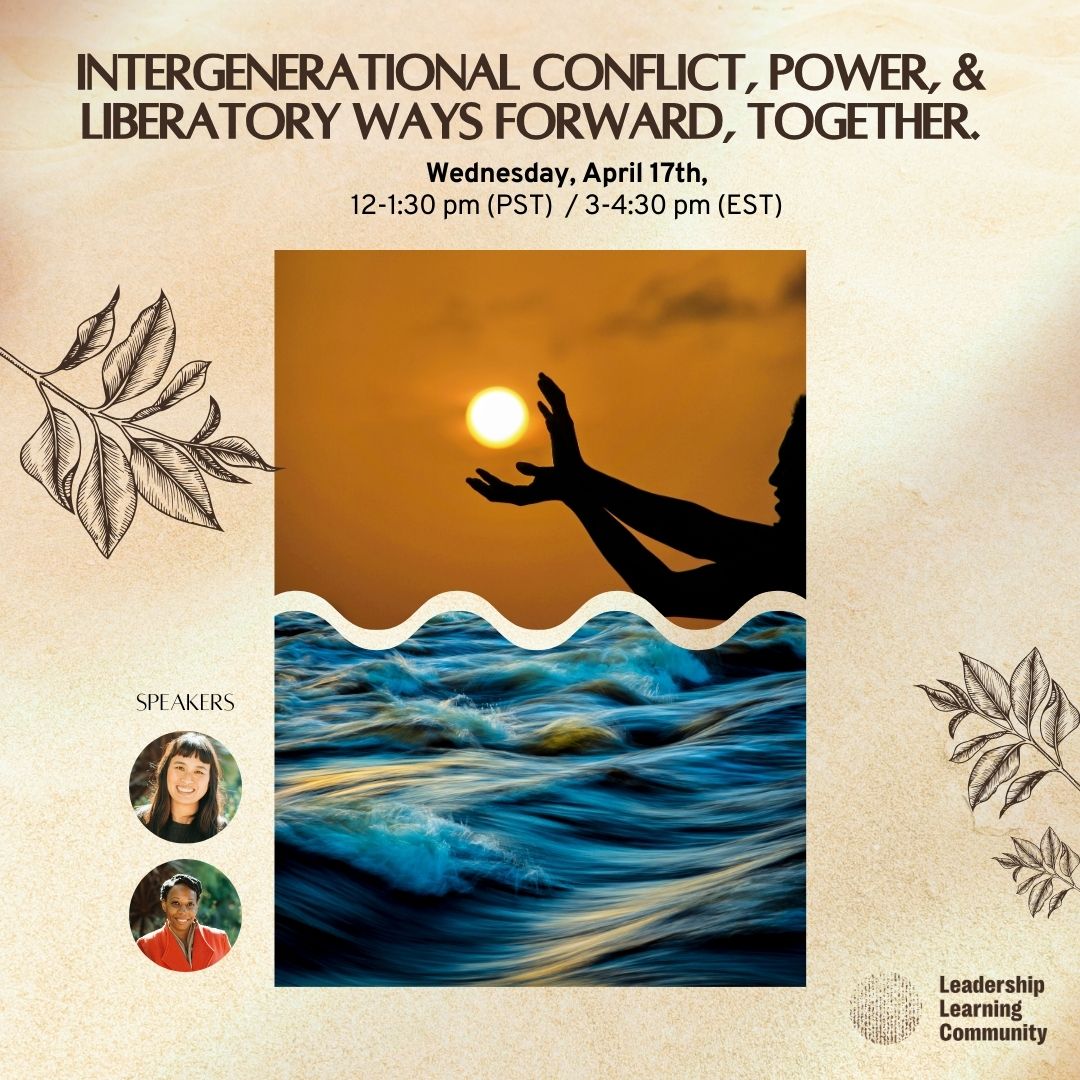Beyond the Algorithm: Tech, Liberation, and the Human-Centered Leadership
The Leadership Cosmos: 25 Years of Expanding Possibilities
Session #3 Beyond the Algorithm: Tech, Liberation, and the Human-Centered Leadership
“Move intentionally, go slowly, be educated and remain human centered. Always preserve the human element. Keep people in our communities safe while leveraging the benefits” - Beth Kanter.
Session Recap
This critical discussion on the intersection of AI, race equity, and liberatory leadership explored how AI tools, while increasingly prevalent, often provide responses that are harmful or fail to capture the nuanced experiences of BIPOC leaders. Alongside insights from experts like Beth Kanter, we examined how to actively mitigate risks and biases in AI usage and ensure a human-centered approach, staying true to liberatory values and centering the voices of those with lived experience.
Speakers
Beth Kanter is an internationally recognized thought leader in digital transformation and wellbeing in the nonprofit workplace. Named one of the most influential women in technology by Fast Company, she has over three decades of experience in designing and delivering training and capacity-building programs for nonprofits and foundations. She is a sought-after keynote speaker and workshop facilitator. Beth was recently awarded the lifetime achievement in nonprofit technology from NTEN. She is the author of The Happy Healthy Nonprofit: Strategies for Impact without Burnout and The Networked Nonprofit.
Supporting Materials
- The Human-AI Partnership Philosophy: Democratize Strategic Thinking and Build Movement Intelligence.
- Practical Guidance for the Use of Generative Artificial Intelligence in the Practice of Law.
- Artificial Intelligence Framework for an Equitable World.
- Artificial Intelligence & Nonprofits Resources
- Galaxy Background – Zoom Immersive View
- Zoom Immersive View in Webinars and Meetings.
![]() by LLC Staff
by LLC Staff
From Isolation to Liberation: Cultivating Constellations of Care
The Leadership Cosmos: 25 Years of Expanding Possibilities
Session #2: From Isolation to Liberation Cultivating Constellations of Care
“What does it look like for us to be keeping people safe and thriving in this system, the current system, while resourcing the power building and creativity that's needed to bridge to the next systems.” - Trish Adobea Tchume
Session Recap
This virtual webinar, Ericka Stallings and Trish Adobea Tchume explored how the current moment demands that we build our capacity for acting in community and with solidarity. This is not a time well served by going it alone. In this conversation, we explored ways to honor our collective humanity by adopting practices and mindsets that support collaborative action and care. In the Leadership and Race report, we discussed making a “call to each other” by moving away from “heroic leadership” models and towards collective and networked leadership that strengthens interdependence rather than isolation.
Leadership rooted in connection, care, and reciprocity is how we build resilient, liberatory communities. Taking time to reflect on who we turn to for help and who we can support grounds us in interdependence. Identifying practices, tools, and sources of inspiration and joy reminds us that leadership isn’t just about action. It’s about sustaining ourselves and each other for the long haul. Change work is human work, and staying connected to purpose, play, and care is essential to leading towards liberation.
Speakers
Trish Adobea Tchume is a first-generation Ghanaian-American, a social and racial justice advocate, facilitator, and trainer. She is the Vice President of the Robert Sterling Clark Foundation. Trish collaborates with other organizations to explore, define, and support leadership and organizational approaches that prefigure a world where all of us can thrive. Trish is a Brooklynite, a proud auntie, a beach stan, and devotes her volunteer time to cool projects like the Central Brooklyn Food Coop and the boards of Change Elemental and the New York Foundation.
Supporting Materials
![]() by LLC Staff
by LLC Staff
Exploring Power Dynamics & Principled Accountability
Exploring Power Dynamics & Principled Accountability
This session is hosted by Ananda Valenzuela, in partnership with Resilience Initiative and Leadership Learning Community.
Ananda Valenzuela (any pronouns) provides interim executive director leadership, facilitates organizational transformation, and coaches values-aligned leaders. He is passionate about nourishing joyful organizational cultures, supporting equitable self-management, and building liberatory practices. They have served as interim executive director at multiple organizations, provided capacity-building support to nonprofits for over ten years, and currently sit on the boards of Change Elemental and Hampshire College. Ananda grew up in Puerto Rico and slowly made her way across the United States, holding a variety of consulting, governance, and activist roles along the way.
Learning Outcomes
- Unpack assumptions about how power and decision-making need to be held in organizations.
- Understand what it looks like to move from power-over to power-with in the workplace.
- Learn how to build a high-integrity workplace by developing effective accountability agreements
Supporting Materials
- Bilingual Exploring Power Dynamics and Principled Accountability Presentation
- The Liberatory World We Want to Create: Loving Accountability and the Limitations of Cancel Culture
- Trading Glass Ceilings for Glass Cliffs
- Thinking in Systems by Donella Meadows
- Recording of Generative Conflict Training
- Power & Accountability Agreements
- El mundo liberador que deseamos crear: La rendición de cuentas amorosa y las limitaciones de la cultura de la cancelación
- Sources of Power / Fuentes de Poder
- Pensando en sistemas por Donella Meadows
- Grabación del entrenamiento sobre conflicto generativo
- Acuerdos sobre Poder y Responsabilización
![]() by LLC Staff
by LLC Staff
Centering Joy and Love in Times of Crisis
The Leadership Cosmos: 25 Years of Expanding Possibilities
Session #1: Centering Joy and Love in Times of Crisis
“Radical self-love is the opposite of selfishness” - Shiree
Session Recap
This interactive virtual webinar Iman Mills Gordon & Shiree Teng. explored our liberatory framework, informed by critical love theory, that positions joy and love as essential drivers of resilience, connection, and meaningful change, especially when facing adversity.
Joy and love are not just emotions but essential leadership tools that sustain movements, build resilience, and create cultures of belonging and care. They are also at the core of liberatory leadership. The essence of what differentiates liberatory leadership from traditionally oppressive systems. Systems of oppression thrive on extraction, burnout, and fear—they teach us that urgency, scarcity, and suffering are necessary for change. Choosing joy and love disrupts these patterns and reclaims our right to well-being, creativity, and connection.
“The moment we choose love, we begin to move towards freedom, to act in ways that liberate ourselves and others.” -bell hooks
Speakers
Shiree Teng is a community organizer, storyteller, and healer who believes that love and courage will lead the way towards our collective liberation. An immigrant kid who grew up organizing, she has never stopped.
Grounded in Radical LOVE, Shiree challenges the burnout culture pervasive in the nonprofit sector. She is a truth-teller and healer who names what others are afraid to say, while giving leaders tools to reimagine the work together. With deep insights into race, class, gender, and power dynamics, she brings a rare lived understanding to her work, inspiring countless leaders to own their power and tell their stories.
Supporting Materials
Reflection Exercise
What is the trash in your life that you need to compost?
-
The first question is, what choices did you make today that disrupted your own oppression and joy?
-
Number two. What are your stories that are about your power and joy? To what extent have you owned them? To what extent have you named them? What is one thing you might try?
-
Number three, boundaries. How healthy are they? How strong are they? How well have you communicated them to others?
-
Number four is Joy, to what extent did I allow, invite, and practice joy today? And what can I still do with the remaining minutes of my day?
-
And then, fifth is my dark and my light. What am I learning about myself today? How did I shine? How did I hide my light? To what extent have I embraced my own light and dark?
We collectively created this Joy and Love playlist during our session — thank you to everyone who contributed! If you’d like to add your own music that brings you joy or reminds you of love, feel free to email us at [email protected], and we’ll add it to the playlist.
![]() by LLC Staff
by LLC Staff
Practicing Giving and Receiving Feedback
Practicing Giving and Receiving Feedback
This session is hosted by Ananda Valenzuela, in partnership with Resilience Initiative and Leadership Learning Community.
Ananda Valenzuela (any pronouns) provides interim executive director leadership, facilitates organizational transformation, and coaches values-aligned leaders. He is passionate about nourishing joyful organizational cultures, supporting equitable self-management, and building liberatory practices. They have served as interim executive director at multiple organizations, provided capacity-building support to nonprofits for over ten years, and currently sit on the boards of Change Elemental and Hampshire College. Ananda grew up in Puerto Rico and slowly made her way across the United States, holding a variety of consulting, governance, and activist roles along the way.
Session Recap
This is an interactive session in which participants were paired in role-play sessions and practiced a real-life situation in which they needed to provide some challenging feedback.
Learning Outcomes:
- Understand effective approaches to giving and receiving feedback.
- Access hands-on feedback tools to bring back to the workplace.
- Practice a real-life situation where you need to give challenging feedback
Supporting Materials
![]() by LLC Staff
by LLC Staff
More Than a Phase Webinar | Social Insights x LLC
More Than a Phase: Leadership, Care, & Innovation in Challenging Times
Click here to access the session’s resources and transcript.
We are deeply thankful for the invitation to connect with Social Insights in this session. Thank you to all who joined us.
Social Insights Research held a timely panel discussion featuring organizational leaders who are navigating today’s turbulent social and political climate with commitment, vision, and resilience. Facilitated by Social Insights Founder and CEO Zuri Tau, this conversation featured Ericka Stallings and Nikki Dinh, co-executive directors of Leadership Learning Community. Inspired by Social Insights’ 2025 motto, “More Than a Phase”, this discussion was a reminder that our presence and what we value and care about are not temporary.
This session explored:
- How do we stay rooted in vision and purpose when the future feels uncertain?
- How are we innovating to meet the moment with courage and creativity?
- How do we care for our people—our teams, communities, and ourselves—while leading change?
![]() by LLC Staff
by LLC Staff
Mending Session 5 | The Art of Repair: Harmony & Dissonance
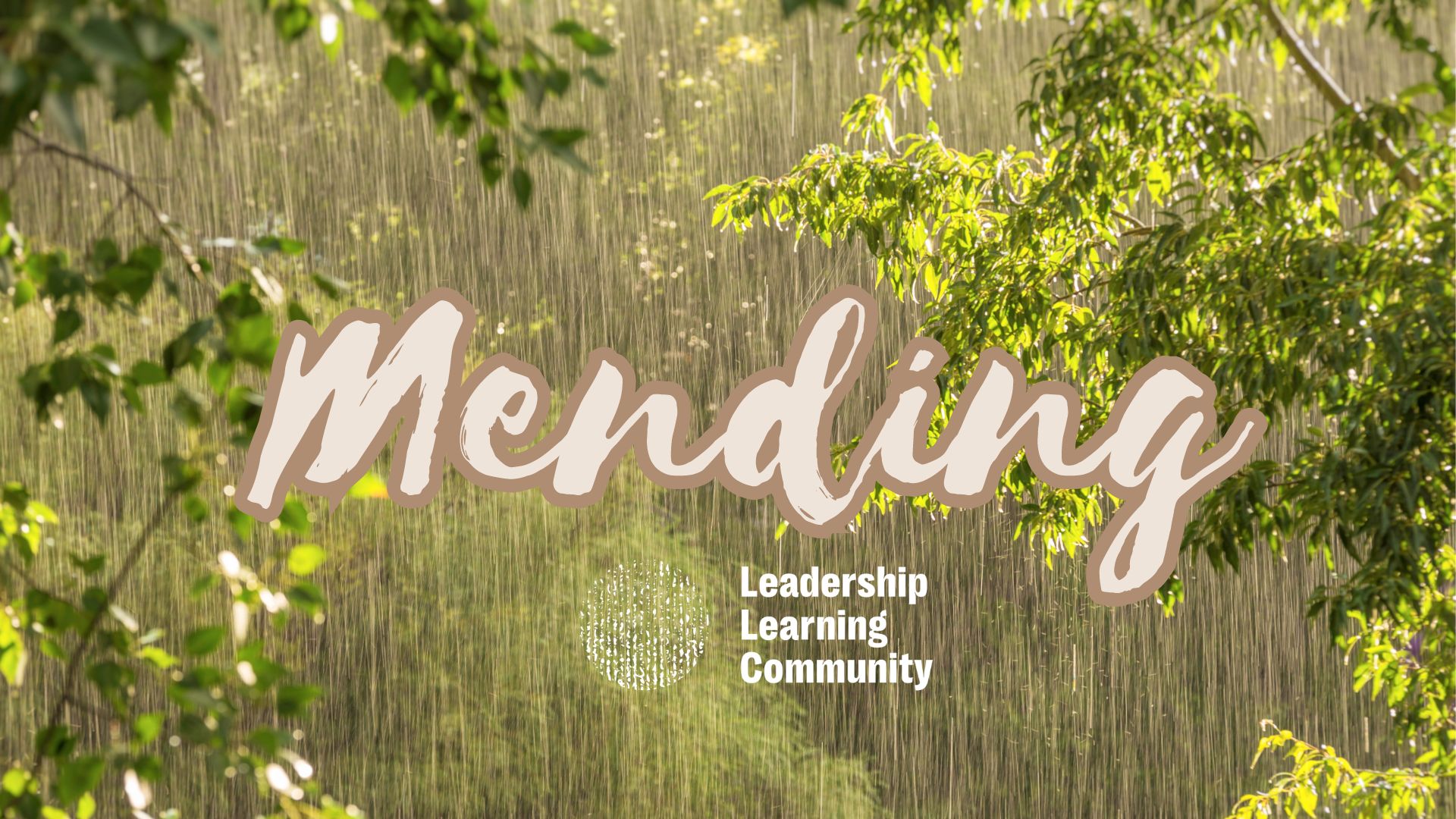
Session 5: The Art of Repair: Harmony & Dissonance
Speakers
- Mizan is the Co-Creator of Spearitwurx, an organization that inspires Intergenerational Wellness and Racial Healing through cultural arts, community events, strategic consulting and transformative educational experiences. Mizan is also a certified Healing Centered Engagement Trainer with Flourish Agenda and has a master’s degree in public health. She is an experiential and Installation artist and has exhibited work throughout California. She is the artist and curator of the Experience Sankofa Project Living Museum. See more of Mizan’s artHERE. Certified Therapeutic Yoga instructor by Niroga, Mizan incorporates creative expression and dynamic mindfulness into her work for social transformation.
- Sizwe is an Educator, Radical Healer and Mentor and has worked throughout the Bay Area. He has supported African American Wellness through the National Campaign for Black Male Achievement, Oakland Freedom School, Flourish Agenda’s Camp Akili, Oakland Unified School District’s Manhood Development Program, and Determination Black Men’s Group at United Roots, to name a few. As Co-Founder and Director of Cultural Engagement at Spearitwurx, he approaches the work with passion and insight. Sizwe believes that connectedness is our currency and that building authentic intimacy is key to our relationships. The practice of being vulnerable with each other can help us get to a place of transformation and liberation. Sizwe utilizes his skills as a performer to build awareness and connection and open doors to self-mastery. Sizwe, also known as Spear of the Nation, is an MC and producer. Spear has released 11 studio albums, both as a solo artist and with the groups Lunar Heights and Potliquor, and has been featured on a host of songs over the past 20 years of his career. To see more about Spear of the Nation music, see www.spearofthenation.com
Part 1: The Art of Harmony & Dissonance
Part 2: What is your favorite or go-to tool for mending/repair?
Part 3: Why is learning to navigate conflict important for leading us to liberation, especially as Black people?
Part 4: How do you build on layers and see the connections or potential for harmony in things that look or sound very different?
Part 5: How has conflict shown up in your artwork, or how have you expressed conflict in your artwork?
Session Recap
Leadership Learning Community, along with Mizan Alkebulan-Abakah, MPH, and Sizwe Andrews-Abakah, who are the co-founders and directors of SPEARITWURX, held a discussion on Tuesday, May 14, about conflict and how it can be mended through the lens of art. Mizan and Sizwe shared their experiences of navigating the space between dissonance and harmony while also exploring innovative art as a way to imagine conflict. The conversation aimed to provide a new perspective on conflict by discussing, viewing, and listening to art.
![]() by LLC Staff
by LLC Staff
Mending Session 4 | Mending via Policy: Reparations

Session 4: Mending via Policy: Reparations
Speakers
- Brittni Chicuata is the Director of Economic Rights at the San Francisco Human Rights Commission. Her work focuses on policies and programs to eliminate wealth apartheid, build economic equity, and uplift economic opportunities that improve the quality of life for the most marginalized in San Francisco. Her policies have provided guaranteed income payments for Black mothers in San Francisco, improved housing protections, developed standards for citywide racial equity and cannabis, supported the local, state, and national reparations movements, and successfully led first-in-the-nation campaigns.
Session Recap
On Monday, May 6, Leadership Learning Community and Brittni Chicuata explored how we navigate the journey towards mending in policy and community. We delved into the heart of mending relationships, healing practices, reimagining possibilities, and revitalizing faith in collective action.
![]() by LLC Staff
by LLC Staff
Mending Session 3 | Intergenerational conflict, power, and liberatory ways forward, together.

Session 3: Intergenerational conflict, power, and liberatory ways forward together.
Speakers
- Ericka Stalling, Co-executive director at Leadership Learning Community.
- Nikki Dinh, Co-executive director at Leadership Learning Community.
Session Recap
On Wednesday, April 17, we hosted a conversation with folks who identify with different generations to move beyond sweeping generational assumptions and explore the intricacies of intergenerational conflict in the social good sector. Through breakout rooms, activities, and even some fun, we shared our experiences, delved into the dynamics of power sharing and its fundamental importance, and uplifted practical and liberatory ways forward together.
![]() by LLC Staff
by LLC Staff
Mending Session 2 | Mending Practice Experimental Field Trip

Session 2: Mending Practice Experimental Field Trip.
Speakers
- Jessica Marquez is the maker behind Miniature Rhino, a handmade business named after a young cousin’s imaginary friend, a dentist called Dr. Rhino. Miniature Rhino became a symbol of creativity and imagination and seeks to inspire and teach hands-on skills through a line of embroidery kits, patterns, classes, and books. Jessica has taught throughout the country, internationally, and online in classes covering all things hand stitching, from embroidery, mending, sashiko, big stitch quilting, refashioning, and also photography. She earned an MFA in Imaging Arts from Rochester Institute of Technology. Her work has been featured in publications including Grace Bonney’s (Design*Sponge) bestselling book, In the Company of Women, Real Simple, Bust, Country Living, and InStyle magazine. She’s written two books, Make and Mend (Ten Speed, 2018) and Stitched Gifts (Chronicle, 2012).
This video has been edited to protect the speaker’s intellectual property. Some parts may have been modified or omitted to safeguard confidential content. We’ve made every effort to maintain the coherence of the speaker’s message. Thank you for watching and respecting the speaker’s intellectual contributions.
Session Recap
On Tuesday, April 9, The Leadership Learning Community hosted Mending #2: Mending Practice Experimental Field Trip. During the session, we wanted to create a space for practicing visible mending and reflect on how this hands-on practice intersects with our conflict, healing, and transformation concepts. Drawing from our previous grounding conversation, we recognized the need to break away from conventional responses to conflict. This session offers an opportunity to practice a new skill, explore alternative approaches, and self-discovery.
Why Sashiko? We chose Sashiko for its unique ability to address conflict or tears with hope and intention for repair. This traditional Japanese method emphasizes acceptance of the rift and the transformative power of mending, turning imperfections into part of the story and beauty of the piece.
Click here to view Recap: Mending Session #2 Mending Practice Experimental Field Trip
![]() by LLC Staff
by LLC Staff
